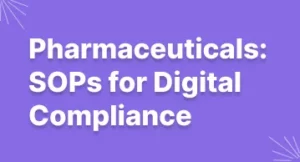Data Integrity: Harness Its Power to Seamlessly Transition to Pharma 4.0
Data Integrity: The Key to Successful Pharma 4.0 Transition
In the current digital age, data integrity has become increasingly important as organizations strive to transition into a more automated and efficient working environment. Data integrity is the assurance of accuracy, completeness, and consistency of data throughout its lifespan in a given system — this includes data entry, storage, and retrieval. As the healthcare industry moves towards Pharma 4.0, it is even more crucial to ensure that data integrity is maintained in order to make informed decisions and carry out business operations effectively.
Pharma 4.0 is an umbrella term for the transition of the pharmaceutical industry to more advanced technologies and increased automation. This means that data collection and storage systems must be accurate, secure, and reliable. Without these data points, organizations cannot ensure the efficacy of their products or develop new treatments for various diseases.
Data integrity is thus essential for successful transition into Pharma 4.0. By ensuring accuracy and consistency of all data stored within a system, organizations can benefit from improved decision making, increased efficiency, and protection against malicious data breaches. Developing a comprehensive data integrity system is essential for achieving success within Pharma 4.0.
Outline the Key Benefits of using Data Integrity in transitioning to Pharma 4.0
Data Integrity is a critical component for any successful transition to the increasingly advanced and sophisticated Pharma 4.0 era. As this period brings with it a much greater reliance on data, utilizing Data Integrity is essential to ensure that all of the process information gathered remains accurate and reliable.
Its effectiveness can be seen in a number of areas. Firstly, by ensuring data accuracy, appropriate decision making is enabled. Additionally, applying Data Integrity helps to reduce the probability of errors or omissions in data processes, leading to significant cost savings in both time and money.
Other benefits include reducing audit risk, achieving compliance with applicable regulations, and identifying opportunities to improve existing processes. Furthermore, the application of Data Integrity ensures that organizations remain competitive, as data accuracy and reliability allow organizations to use their resources more efficiently and become more agile.
It is clear then that Data Integrity offers significant advantages for transitioning to Pharma 4.0. By implementing a successful Data Integrity system, businesses can benefit from improved accuracy and reliability, reduced costs, and a better approach to regulatory compliance.
Discuss the Consequences of not ensuring Data Integrity
Data Integrity is a must-have for transitioning to Pharma 4.0, and not taking proper precautions can lead to serious consequences. When Data Integrity is compromised, important data can become incorrect, incomplete, or even lost, resulting in serious financial losses and reputational damage.
Incorrect or incomplete information can lead to faulty decision-making, misallocation of resources, and inaccurate measurements. Data accuracy and integrity needs to be tracked constantly, so when an issue arises, it can be identified and dealt with quickly. Without this system in place, problems may remain undetected and can cause long term issues for your business.
There is also a risk of non-compliance with regulatory standards, which can come with hefty fines. Organizations are required to implement certain data security measures as well as maintain certain standards with regards to their data handling practices, and failing to adhere to these can have severe repercussions.
Lack of Data Integrity can also lead to customer dissatisfaction. Customers expect accurate and up to date information at all times, and any inconsistencies can lead to mistrust. Poor customer service due to incorrect or incomplete data can cause a company to lose customers, impacting its bottom line.
It is therefore essential that organizations take steps to ensure Data Integrity is maintained in order to achieve successful transition to Pharma 4.0.
Best Practices for Implementing a Data Integrity System
Data integrity is an essential factor in the successful transition to Pharma 4.0. It is important to ensure data accuracy and security, as even minor errors can have major repercussions. To this end, it is vital to implement proper practices to achieve data integrity within the organizational systems.
Creating a secure system requires the use of several best practices in order to ensure data accuracy and integrity. The following are some key recommended practices to use when developing a data integrity system:
- Establishing clear policies and procedures for data entry and storage.
- Verifying the accuracy of data at every point of entry.
- Making sure that data is backed up on a regular basis.
- Conducting periodic audits of data to identify and fix errors.
- Implementing access control measures to restrict data access.
- Using strong encryption and other security measures to protect data.
By following these best practices, organizations can ensure that their data integrity systems are highly effective and efficient in protecting and preserving data accuracy. Additionally, they can help to prevent any potential data breaches or misuse of data.
Exploring Modern Technologies for Data Integrity
Data integrity is essential for a successful transition to Pharma 4.0, and modern technologies can help to ensure accuracy and integrity. Modern technological solutions can range from simple point-of-entry verification to sophisticated software-driven data analysis. Beyond that, these solutions can come in the form of hardware or software-focused options.
Hardware-based solutions typically provide higher levels of security, because data passes through specialized filters before being stored. Software-based solutions, on the other hand, involves automated processes and rules-based algorithms to flag errors and anomalies. Both of these options make it easier to detect and prevent poor data quality, thus improving overall data accuracy and reliability.
Other key benefits of using modern technologies include reducing the time and effort required to maintain data integrity, as well as providing better visibility into data quality issues. This increased visibility can help organizations identify the root causes of errors and take corrective action accordingly. In addition, these modern technologies also allow for better control of data access and usage, helping organizations adhere to industry standards and regulatory frameworks.
In short, incorporating modern technologies is an important step when transitioning to Pharma 4.0. This ensures data accuracy and integrity while helping organizations to remain compliant with industry policies and regulations.
Highlighting Compliance of Data Handling Practices
Data Integrity is an integral part of transitioning to Pharma 4.0 and proper compliance methods must be developed in order to ensure correct data handling practices. Compliance, in this case, refers to the regulatory requirements and standards that must be met when handling data, such as HIPPA standards for patient data or GDPR standards for EU customer data. It is vital for organizations to understand and adhere to these regulations, as non-compliance can have serious legal repercussions.
When developing a Data Integrity system, organizations should not only consider the technical aspects but the procedural aspects of data management as well. This means setting up written processes to ensure data is handled consistently and with respect to regulatory best practices. Developing an overall approach to compliance and registering it with the appropriate regulatory agency is also important. By taking these steps, organizations can ensure their data is handled safely and securely and is compliant with all applicable regulations.
Organizations should also consider ways to audit and track data integrity systems, as well as develop checks and balances that help to prevent data misuse or breaches. This includes conducting regular reviews to ensure data is stored properly and records are kept up-to-date. Having an audit trail in place can also help organizations spot any trends or patterns that could lead to potential issues with data integrity.
How Does Data Integrity Relate to Other Industry-Specific Policies and Guidelines?
Data integrity is an important concept in any industry, and this is especially true in the pharmaceutical industry as it looks to transition to Pharma 4.0. Data integrity is closely linked to industry-specific policies and guidelines, and must be taken into account when transitioning to Pharma 4.0.
Data integrity is an important factor in ensuring that information is accurately represented in an environment, such as a clinical trial or a manufacturing process. The accuracy of the data provided is essential for any successful transition to Pharma 4.0. Data integrity is also essential for compliance with regulatory frameworks, to ensure that organizations are compliant with public health laws and requirements.
The appropriate use of data integrity is fundamental to the security and accuracy of systems. Policies and guidelines such as traceability, compendial standards, and 21 CFR Part 11 will need to be implemented when transitioning to Pharma 4.0. This will ensure the accuracy and integrity of the data and help ensure that regulations are being adhered to.
Any organization looking to transition to Pharma 4.0 must take data integrity into consideration. Policies and guidelines must be properly implemented to ensure that the data is accurate and can be trusted. Without this, there may be an increased risk of errors and adverse outcomes that could impact the success of the transition.
Why Is Data Integrity Essential for Organizations?
Data integrity is essential for organizations to stay ahead in the changing business environment. It provides the basis for making accurate decisions by ensuring that data is valid, complete, and authentic. Data integrity gives organizations a competitive edge as it helps them analyze their operations better and make informed decisions.
Organizations need data integrity to maintain accuracy and consistency throughout their systems, processes, and operations. It helps to reduce risks, create trust, and protect assets from malicious activity. Data integrity also allows organizations to scale up their operations while maintaining accuracy and consistency of data.
Integrating data integrity into organizational systems ensures that data remains intact and secure, and remains consistent even when transmitted, modified, or stored. This makes sure that the data is available and can be used by the organization whenever necessary. Data integrity also provides transparency and accountability for the organization by ensuring all data is valid, complete, and authentic.
Data integrity also helps organizations comply with industry regulations and practices. This ensures that they are operating within the prescribed parameters and that their data is accurate and secure. It also helps protect stakeholders who rely on the accuracy of the data they receive from the organization.
The Importance of Data Integrity in Transitioning to Pharma 4.0
Data integrity is essential when transitioning into Pharma 4.0, as it ensures that all data within an organization is accurate and reliable. Without proper data integrity protocols, organizations can suffer from significant losses due to incorrect information being used. In addition, improper data handling practices can result in major regulatory and compliance issues that could lead to costly fines and penalties.
Data integrity involves making sure that the data is accurate and up-to-date, free from any manipulation or errors. It also requires that systems are regularly monitored and maintained to ensure that all data is secure and protected from malicious third parties.
Having good data integrity protocols in place can help organizations transition to Pharma 4.0 efficiently. Data integrity is paramount for a successful transformation as it enables organizations to collect, store, and use data in a safe and secure manner. In addition, data integrity helps organizations maintain compliance with industry-specific regulations and guidelines.
Furthermore, implementing proper data integrity systems can help organizations reduce costs and increase efficiency by reducing time spent validating and verifying data. By ensuring all data is accurate and up-to-date, organizations can make decisions with confidence and know that their systems are running smoothly.
It is clear that data integrity plays an important role in transitioning to Pharma 4.0. Organizations that invest in data integrity systems have a greater chance of success in their transition, which is why it is vital for organizations to ensure they have the necessary protocols and processes in place. The importance of data integrity cannot be overstated when it comes to transitioning to Pharma 4.0 and beyond.
Data Integrity Tools, Techniques and Solutions
Data integrity is essential for a successful transition to Pharma 4.0, and as such, there are a number of tools, techniques, and solutions available to ensure accuracy and integrity. Data integrity tools help organizations review, check, and monitor data to detect errors or discrepancies. This can include manual review processes, automated comparison systems, and data scrubbing.
Data integrity techniques involve timing controls that can help verify the origin and accuracy of data over time. These may include time-stamping, version control, and transaction logging. To maintain data integrity, solutions may involve the use of encryption, access control policies, and data validation protocols.
Businesses should also consider using an automated data review process to identify errors and inconsistencies in data quickly and efficiently. As technology advances, more sophisticated data integrity tools, techniques, and solutions are becoming prevalent, helping to ensure accurate and secure data.
Overcoming Obstacles to Successful Data Integrity Implementations
Data integrity is a key component of successfully transitioning to Pharma 4.0. However, implementing the necessary data integrity systems and procedures can be difficult, particularly for larger organizations. Fortunately, there are some useful tips and tricks that can make the process easier.
One of the most important steps is to create a data governance plan and framework. This should include security protocols for protecting sensitive information, as well as guidelines for logging and auditing data activities. Establishing these processes and making sure that everyone follows them is essential for ensuring proper data integrity.
Another effective strategy is to utilize automation and modern technology when possible. Automating certain processes, such as data entry and verification, can help reduce the risk of errors and ensure accuracy. Additionally, investing in modern data management systems can make it easier to track and monitor data activities, as well as detect any irregularities or suspicious behavior.
It is also important to have an effective training program in place. All employees must be taught to understand and follow data integrity best practices. This includes learning how to properly enter and store data, using secure passwords, and reporting any issues or concerns they have to the relevant authorities.
Finally, it is important to engage with industry-specific regulations and standards. Keeping up to date with data integrity requirements can help ensure compliance and minimize the risk of fines or other penalties.
By following these tips and tricks, organizations can overcome the obstacles to successful data integrity implementations and ensure that their transition to Pharma 4.0 is successful.
Conclusion: The Significance of Data Integrity in Pharma 4.0
Data integrity is an essential part of transitioning successfully into Pharma 4.0. By properly implementing a data integrity system, organizations can ensure that their data processing and storage systems are compliant and accurate. With the proper tools, techniques, and solutions, data accuracy and integrity can be preserved and trustworthy data can be produced for decision-making purposes. Additionally, implementation of data integrity strategies and processes can reduce the risk of costly errors and penalties due to noncompliance.
Data integrity is also related to other industry-specific policies and guidelines. It is important to take these policies into account when developing and integrating data integrity solutions into organizational systems. By focusing on data integrity throughout the transition process, organizations can reach the highest standards of Pharma 4.0, ensuring accurate data and reliable records for future use.
In conclusion, data integrity is an essential part of transitioning successfully into Pharma 4.0. Organizations must ensure compliance with industry-specific policies and regulations as well as develop effective data integrity solutions that incorporate modern technologies. By dedicating resources to data integrity, organizations can reduce risks associated with noncompliance and benefit from reliable data for decision making.
Frequently Asked Questions About Data Integrity and the Transition to Pharma 4.0
1. What is Data Integrity?
Data Integrity is a system of maintaining and verifying the accuracy and completeness of data throughout its life cycle, from collection and reprisal to storage and use. It ensures that data is precise, consistent, and reliable across all systems, so that the results you get from any particular system will always be trustworthy.
2. What are the key benefits of using Data Integrity in transitioning to Pharma 4.0?
The primary benefits of Data Integrity are increased transparency, efficiency, productivity, cost savings, improved decision-making, and better safety and security. Utilizing Data Integrity while transitioning to Pharma 4.0 will help organizations reduce risk, increase compliance, maintain quality progress, and generate accurate information.
3. What are the consequences of not ensuring Data Integrity?
By disregarding Data Integrity protocols, organizations could suffer from increased costs due to duplication of effort, erasure of data, an inability to verify processes and activities, missed opportunities due to lack of time, security issues, and inaccurate reporting.
4. What are some best practices for implementing a successful Data Integrity System?
Best practices for successful Data Integrity Systems include: establishing a Corporate Data Integrity Officer (CDIO); developing a risk-based Data Integrity Management System; continuously assessing the information systems for integrity, security and accuracy; having effective training for all personnel; implementing procedures to ensure data integrity and accuracy throughout the business process; and establishing data governance standards.
5. How can modern technologies be used to ensure data accuracy and integrity?
Modern technologies, such as Advanced Process Control (APC) and Creator and Distributor tools, can be used to automate and standardize data management processes and ensure that data is stored in an efficient way. Additionally, analytics platforms and predictive modeling can be used to identify potential errors, inaccuracies, or anomalies and alert personnel to incidents where data integrity may be compromised.
6. What are some of the available Data Integrity tools, techniques, and solutions?
Some of the available Data Integrity tools, techniques, and solutions include document version control software, cloud technologies, Electronic Laboratory Notebooks (ELNs), paperless records, and Laboratory Information Management Systems (LIMS). Additionally, validation processes, audit trails, and the Global Harmonization Initiative (GDI) can also help organizations achieve maximum data integrity.
7. Why is Data Integrity so important in transitioning to Pharma 4.0?
Data Integrity is essential for achieving success in transitioning to Pharma 4.0. By having consistent and accurate data, businesses can guarantee that their processes are secure and compliant with industry standards, and they can make better decisions. Furthermore, implementing Data Integrity systems increases productivity and cost savings while reducing the risk of delays, errors, and data breaches.







